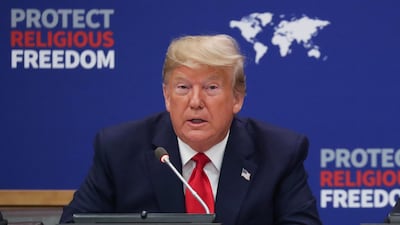For the 74th year, world leaders gather at the United Nations for the General Assembly that in effect should determine the path the world will take in the coming year. Each country has the opportunity to lay out their vision and intentions to the other 192 UN states. Of course, politics and circumstance often get in the way of even the best intentions.
Since the international organisation’s inception, the United States has been a leading member and its president’s address eagerly anticipated. This is even more so after a new president is elected, as it becomes an opportunity for him — so far they have all been men — to lay out his foreign policy doctrine, particularly after major events. Like George W Bush’s speech after the September 11 attacks and the start of the Afghan war, which set the tone for American policies in confronting terror and the international community’s support for them.
The idea of an "unveiling" of policy in a speech was until recently quite popular among advisers of American presidents. Barack Obama used speeches, and their immediate dissemination across social media platforms, often in multiple languages, as a key tool in setting out his policy agenda.
With the advent of 24-hour news cycles and a variety of social media outlets allowing leaders to express their opinions and positions consistently, the impact of speeches has inevitably become less significant. Since his election, President Donald Trump has used Twitter as the primary outlet of his views – from major policy announcements to the relieving of key officials from his administration, as happened earlier this month with National Security Adviser John Bolton.
And yet these developments do not detract from the continued significance of the United Nations address. On Tuesday morning, as President Trump takes the podium, his counterparts, or their representatives, will be in attendance and taking note of his approach to major challenges. UN speeches traditionally go through various iterations before they are delivered and go record. Yet, Mr Trump’s speeches are different. In 2017 he gave his first speech to the UN, using his famous electoral promise “I will always put America first” – a variation on ”Make America Great Again”. His address will be remembered also by his reference to North Korea’s leader Kim Jong-un as “Rocket Man” – saying “rocket man is on a suicide mission” and threatening to “totally destroy North Korea”. Only months later, he met Mr Kim and started a push for a diplomatic solution.
Like all leaders, Mr Trump will seek to make statements that garner international attention. And with key issues such as US policy on climate change, Iran, Venezuela and North Korea, it will be important to take note. Yet what makes the current US president stand out is that the positions laid out in his speech could be reversed with a tweet of 280 characters moments later.

